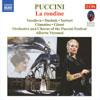Puccini (La) Rondine
A committed cast allows Puccini’s swallow to soar in this fine live version
View record and artist detailsRecord and Artist Details
Composer or Director: Giacomo Puccini
Genre:
Opera
Label: Opera Classics
Magazine Review Date: 12/2009
Media Format: CD or Download
Media Runtime: 0
Mastering:
Stereo
DDD
Catalogue Number: 8 660253/4

Tracks:
| Composition | Artist Credit |
|---|---|
| (La) Rondine, '(The) Swallow' |
Giacomo Puccini, Composer
Alberto Veronesi, Conductor Emanuele Giannino, Prunier, Tenor Fabio Sartori, Ruggero, Tenor Giacomo Puccini, Composer Maya Dashuk, Lisette, Soprano Puccini Festival Chorus Puccini Festival Orchestra Svetla Vassileva, Magda de Civry, Soprano |
Author: po'connor
Despite several recent high-profile productions, La Rondine remains the least-known of Puccini’s mature operas. This must be in part because the tenor role is somewhat ungrateful, despite the addition of the aria “Parigi! È la città dei desideri”, also composed for this 1920 revision but now regularly inserted into the “standard” 1917 edition.
This live performance has plenty of energy. It would be idle to pretend that it in any way rivals the Pappano set with Gheorghiu and Alagna (EMI, 5/97); a definitive recording if ever there was one. As Magda, Svetla Vassileva starts a little uncertainly – it’s hard on the soprano to have to sing the most famous aria “Chi il bel sogno di Doretta” only five or six minutes after the curtain rises. However, as the evening progresses she rises to the challenge, and brings a considerable amount of feeling to the anguish of the final scene. Fabio Sartori too grows stronger as the drama progresses. The secondary couple, Emanuele Giannino as Prunier and Maya Dashuk as Lisette, make a convincing pair of quarrelsome lovers. The long-suffering Rambaldo – Marzio Giossi – gets his little aria in Act 3. As always the big ensemble in the dance-hall scene in Act 2 goes with a terrific swing, Alberto Veronesi leading the Puccini Festival Orchestra with obvious relish. Anyone with a keen interest in Puccini’s work will want to hear this.
Discover the world's largest classical music catalogue with Presto Music.

Gramophone Digital Club
- Digital Edition
- Digital Archive
- Reviews Database
- Full website access
From £8.75 / month
Subscribe
Gramophone Full Club
- Print Edition
- Digital Edition
- Digital Archive
- Reviews Database
- Full website access
From £11.00 / month
Subscribe
If you are a library, university or other organisation that would be interested in an institutional subscription to Gramophone please click here for further information.




